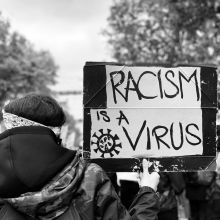By EILEEN POMEROY
(CNS) – A resolution to recognize racism as a public health crisis was adopted by the House of Delegates in 54-37 vote nearly all along party lines..
Del. Carrier Coyner, R-Chesterfield, was the only Republican who voted in support of the resolution. Seven Republicans and one Democrat, Del. Marcus Simon, did not vote.
The resolution, HJ 537, includes steps to address structural racism such as the Commission to Examine Racial Inequity in Virginia Law becoming a permanent commission and training for elected officials, their staff and state employees to recognize and combat implicit bias.
Del. Lashrecse Aird, D-Petersburg. reintroduced the resolution after initially introducing it during last August’s special session. Del. Lamont Bagby, D-Richmond, co-sponsored the resolution.
HJ 537 went to the Assembly floor after a vote by the Committee on Rules on Jan. 22 vote. The measure passed 13-5, with every Republican voting against the resolution.
“Today we have a powerful opportunity to formally acknowledge the systems and structures of inequity that are ravaging through our communities of color and finally began to begin the important process of reconciliation,” Aird said in the Committee’s’ Jan. 22 session.
Janice Underwood, Gov. Ralph Northam’s Chief Diversity, Equity and Inclusion Officer, spoke in support of the resolution at the session.
“The Governor’s Office of Diversity, Equity and Inclusion, and the Office of Health Equity at Virginia Department of Health strongly support this resolution and commit to doing the work to interrupt the systems that have historically allowed and perpetuated inequities and disparities across multiple social determinants of health, as evidenced in the resolution,” Underwood said.
Chloe Edwards, advocacy and engagement manager at Voices for Virginia’s Children, also spoke in support of the resolution at session.
The resolution mentions how Virginia as the epicenter of the slave trade and former capital of the Confederacy still has a “long and embedded history of racism, especially against African Americans,” and that over 100 studies have linked racism to negative health outcomes.
Communities of color also face increased exposure to environmental risks, less access to spaces for outdoor recreation and lack of professional opportunity, according to the resolution.
Decades of school segregation followed by active and passive resistance to school integration resulted in Richmond schools never becoming truly integrated, according to a report by The Commonwealth Institute. Black and Latinx students are likely to attend schools that are composed of nearly all non-white students and have fewer resources and courses than schools with majority-white populations.
Education disparities are intertwined with housing disparities. Racist practices such as redlining, which outlined majority-minority neighborhoods so lenders would deny credit to minority communities, block access to certain neighborhoods, according to the report. Neighborhoods are important as they typically determine which schools students attend and the amount of resources schools have.
People living in redlined neighborhoods have been found to have lower life expectancies and higher rates of chronic disease that are risk factors for COVID-19 such as severe heart disease, obesity and diabetes, according to the National Community Reinvestment Coalition’s report on Redlining and Neighborhood Health.
Black communities in Richmond have suffered disproportionately from COVID-19, and have been hospitalized at a rate four times higher than white patients.
The American Public Health Association (AHPA) and American Medical Association both recognized racism as a public health threat. Five states have already declared racism as a public health emergency along with 104 cities across the country, according to the AHPA.



